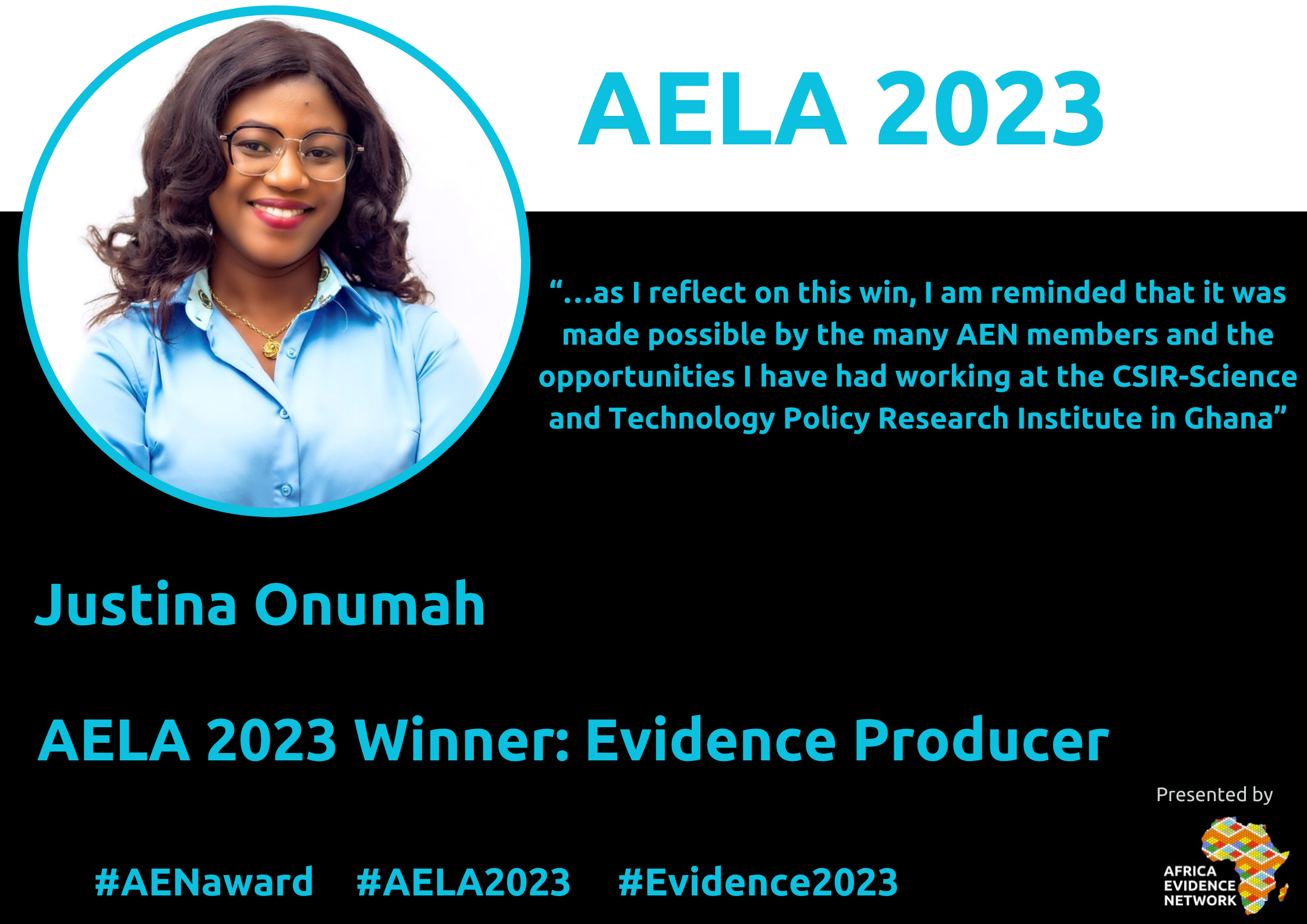
Dr Justina Onumah, is the recipient of the Africa Evidence Leadership Award 2023 in the Evidence Producer category offered by the Africa Evidence Network. We caught up with Justina about receiving the award and asked her some questions about what the Africa Evidence Leadership Award means for her work.
AEN: How did you feel and respond when you were told that you had received the award?
JO: The email notification sound on my phone beeped and I casually checked with no expectations in mind. It was an email communication from the Africa Evidence Network which I initially did not think much of it as correspondence on the voting outcome. Lo and behold, that was it; an email congratulating me for winning the Evidence Producer Category! I quickly jumped on my feet repeatedly saying, “wow Justina, it happened”! To be honest, though no one goes into a competition to lose, I also did not know how I was going to win because all the nominees had solid profiles making the context highly competitive! A part of me was deeply humbled by the confidence of voters in my research works as profiled and a part of me felt a huge responsibility- a responsibility to contribute more in the evidence-policy space in Ghana and Africa as a whole. However, as I reflect on this win, I am reminded that it is was made possible by the many AEN members and the opportunities I have had working at the CSIR-Science and Technology Policy Research Institute in Ghana. These opportunities allowed me to contribute to the core mandate of the Institute, which is to popularize Science, Technology and Innovation (STI) through evidence generation and engagements. One of the very first projects I worked on at the Institute was the Development Research Uptake in Sub-Saharan Africa funded by the UK Department for International Development, through the Association of Commonwealth Universities. The aim of this project was to promote evidence use in policy making through the generation of evidence on key national issues and building capacity of policy makers in using evidence. The experiences under this project spurred my interest in EIDM and the evidence of it is the award we are witnessing at the moment.
AEN: What role do you think the Africa Evidence Leadership Award plays in the evidence-production and -use ecosystem in Africa?
JO: Africa Evidence Leadership Award winners have a unique opportunity to be ambassadors for evidence-informed decision-making (EIDM) in Africa through advocacy and awareness creation. This will amplify the voices of other stakeholders in the evidence-production-and use ecosystem space in Africa. Through the awardees, the status of EIDM in African gets to be showcased through sharing and recognizing impactful evidence stories across countries on the continent. With the effort of one AELA awardee at a time, the status of evidence-use among key decision makers, including policy makers and industry leaders will be raised. Awardees are also stirred to do more in the evidence ecosystem as they lead as ambassadors of the Africa Evidence Network during their tenure.
AEN: Name three ways you believe that you or your work will benefit from receiving the award.
JO: This award presents opportunities for myself and my work in so many ways including networking opportunities, collaborative research projects in EIDM and strengthened capacity building in EIDM. First of all, with this award, I get to physically be present at EVIDENCE which I had always participated in virtually since I joined the network. Being present physically and sharing my work with other participants will increase the networking opportunities I could not have had without the award. These networking opportunities could transform into collaborative research projects in promoting EIDM in Africa and beyond. This will not only be to my advantage but also to my Institution's which is mandated to generate research evidence to inform policy making in the Science, Technology and Innovation space. The learning and capacity building opportunity with this award also present numerous opportunities for me and my work. As the award affords recipients the opportunity to build their capacity in EIDM by taking up further courses in addition to learning from others during the conference, my capacity in the evidence-production-and use space will be further built which will widen my impact in the evidence ecosystem in Ghana and Africa in general. Again, my institution gets to benefit from my strengthened capacity as I will be in a better position to contribute towards the mandate of the Institute.
AEN: Why are these three things important to your work?
JO: These benefits from the award are important to my work because there is nothing like enough capacity as there is always new things to learn and incorporate. The capacities and opportunities needed to unlock a strengthened EIDM may take longer than required without some of these great privileges the award provides. An extra leverage and inertia for all these to be made possible could result from the opportunities the award presents.
AEN: What is the one thing that you are most looking forward to about attending Evidence 2023?
JO: I am most looking forward to creating networks, learning and more learning in the EIDM space. Evidence 2023 will provide me, other awardees and participants the opportunity to learn various strategies and approaches to strengthening evidence generation and use in Africa from other institutions in the evidence space. I also believe EVIDENCE 2023 will be a place for nurturing future collaborative projects that will build capacity of evidence producers, intermediaries and users, as well as promote EIDM across Africa.
Disclaimer
The views expressed in published blog posts, as well as any errors or omissions, are the sole responsibility of the author/s and do not represent the views of the Africa Evidence Network, its secretariat, advisory or reference groups, or its funders; nor does it imply endorsement by the aforementioned parties. Acknowledgments do not imply endorsement of the content.